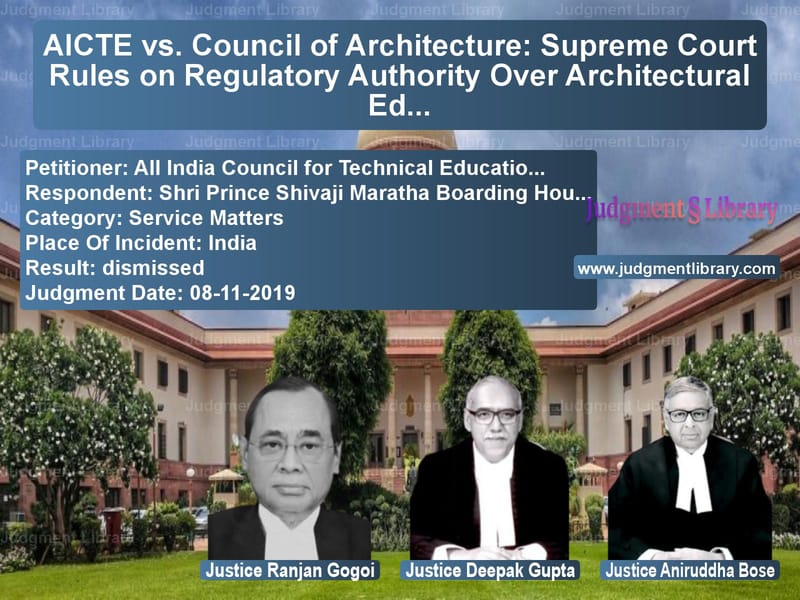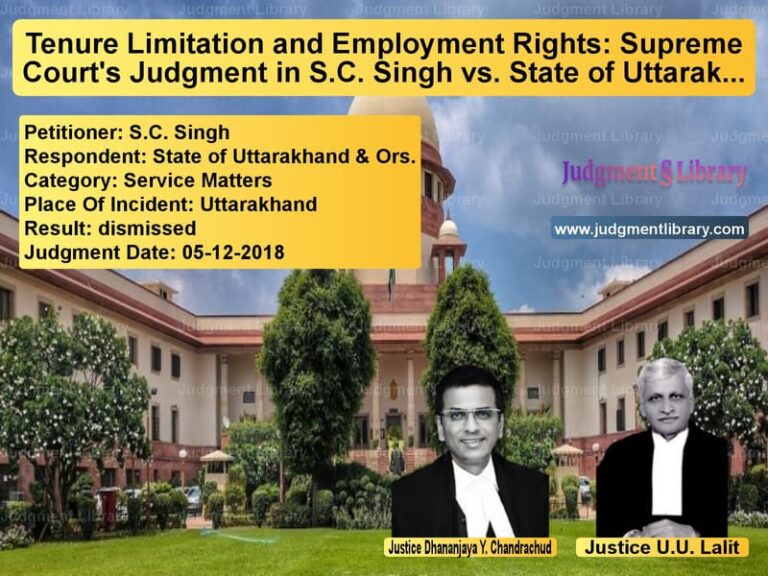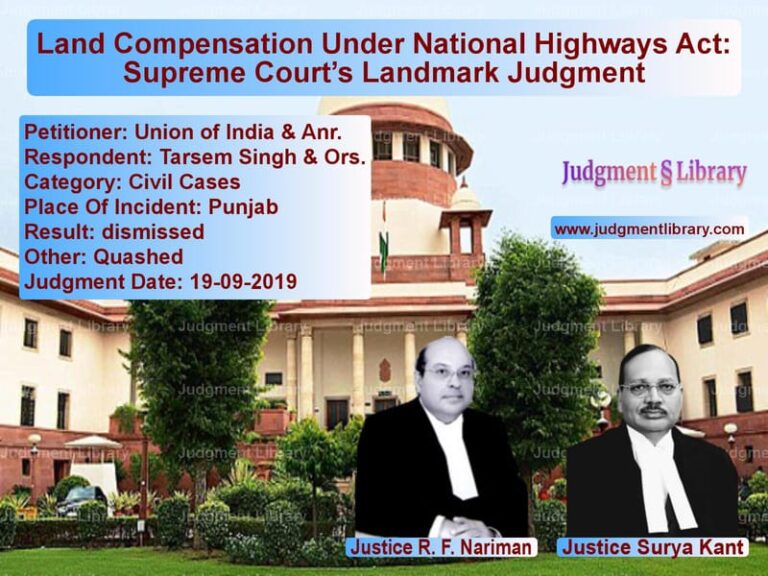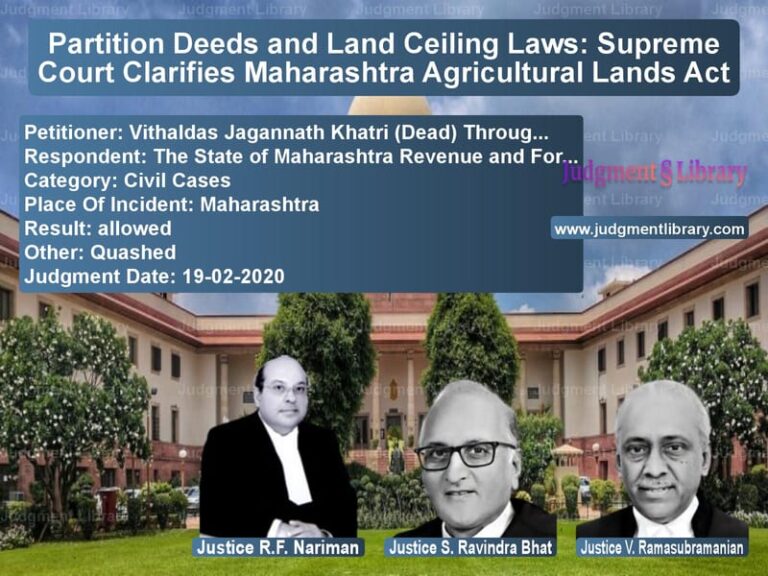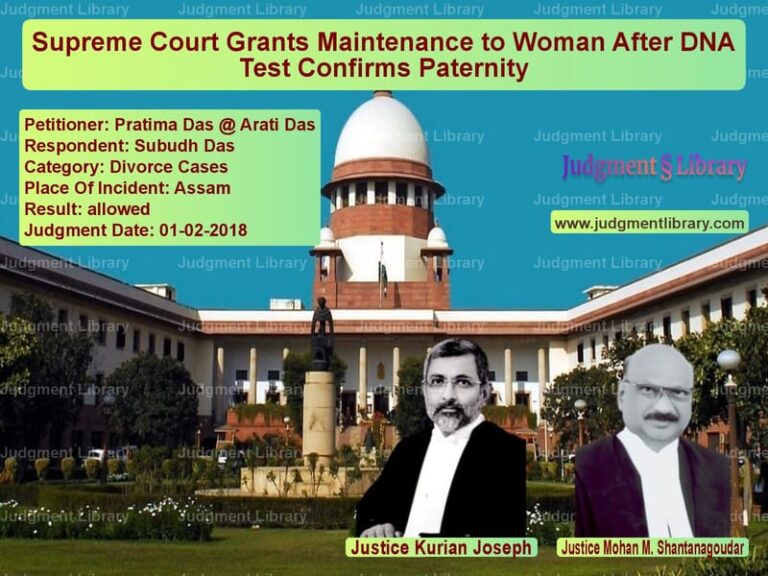AICTE vs. Council of Architecture: Supreme Court Rules on Regulatory Authority Over Architectural Education
The case of All India Council for Technical Education (AICTE) vs. Shri Prince Shivaji Maratha Boarding House’s College of Architecture & Ors. revolved around a crucial legal dispute regarding the authority to regulate architectural education in India. The Supreme Court was tasked with determining whether the regulatory framework of the AICTE or the Council of Architecture (CoA) held primacy in granting approvals to institutions offering architecture courses.
The core issue was whether the Architects Act, 1972 (hereinafter referred to as ‘the 1972 Act’) or the All India Council for Technical Education Act, 1987 (hereinafter referred to as ‘the 1987 Act’) would govern architectural education, particularly in cases where their respective provisions conflicted. The case had significant implications for architectural institutions, universities, and students seeking enrollment in recognized courses.
Background of the Case
The dispute arose when AICTE and CoA issued contradictory directives regarding the intake capacity of an architectural institution—Shri Prince Shivaji Maratha Boarding House’s College of Architecture. CoA restored the intake capacity of the institution from 30 to 40 students per year, whereas AICTE limited it to 30 students based on its regulatory framework.
The Bombay High Court, in its ruling, held that the CoA was the final authority for determining norms and standards in architectural education. AICTE challenged this decision before the Supreme Court, arguing that the 1987 Act had broader jurisdiction over technical education, including architecture.
Petitioner’s Arguments (AICTE)
AICTE contended that:
- The 1987 Act was enacted later and therefore had an overriding effect over the 1972 Act.
- Technical education, as defined under Section 2(g) of the AICTE Act, includes architecture, thereby bringing it under AICTE’s regulatory purview.
- The 1987 Act empowered AICTE to set norms and standards for all technical education programs, including those in architecture.
- The CoA’s role was restricted to regulating the profession of architects and maintaining the register of architects, not determining institutional approval and course structures.
Respondent’s Arguments (Council of Architecture & Institutions)
The CoA and affiliated institutions argued:
- The 1972 Act was a special law enacted specifically to regulate the profession and education of architects, and should take precedence over the general provisions of the AICTE Act.
- Under Sections 14 to 21 of the 1972 Act, the CoA was given authority to recognize qualifications and set minimum standards for architectural education.
- Any individual obtaining a degree or diploma in architecture must be recognized by the CoA to register as an architect in India.
- The CoA had been monitoring and regulating architectural education in the country for decades, and the AICTE’s interference was unnecessary and legally untenable.
Supreme Court’s Judgment
The Supreme Court ruled in favor of the Council of Architecture, holding that the 1972 Act was the governing statute for architectural education. The key findings were:
- The 1972 Act was a special law specifically dealing with the regulation of architectural education, whereas the 1987 Act was a general law covering various fields of technical education.
- As a special law, the 1972 Act would prevail over the 1987 Act in cases of conflict, ensuring CoA’s authority in matters of architectural education.
- CoA’s role in recognizing institutions, granting approvals, and setting educational standards remained legally valid and was not overridden by AICTE’s framework.
- The AICTE Act did not expressly repeal the provisions of the Architects Act, and implied repeal was not applicable in this case.
- Universities and institutions offering architectural courses were required to follow the regulations prescribed by the CoA and seek its approval.
The Court stated:
“The recognition of qualifications in architecture is governed by the 1972 Act, and AICTE’s authority does not extend to regulating architecture education in contravention of the Architects Act. The role of the CoA in setting standards, granting recognition, and ensuring compliance with architectural education norms is paramount.”
Key Takeaways
- The CoA, not AICTE, is the primary regulatory body for architectural education in India.
- Institutions offering architecture courses must comply with CoA’s approval process and educational standards.
- Technical education institutions under AICTE’s purview do not automatically qualify to offer architecture courses unless recognized by the CoA.
- The judgment upholds the principle that a special law prevails over a general law in cases of conflict.
- The ruling ensures that the education and licensing of architects in India remain streamlined under a single regulatory authority, preventing duplication and confusion.
This landmark judgment provides clarity on the regulatory structure for architectural education and reaffirms the authority of the CoA in maintaining professional standards in the field.
Petitioner Name: All India Council for Technical Education.Respondent Name: Shri Prince Shivaji Maratha Boarding House’s College of Architecture & Ors..Judgment By: Justice Ranjan Gogoi, Justice Deepak Gupta, Justice Aniruddha Bose.Place Of Incident: India.Judgment Date: 08-11-2019.
Don’t miss out on the full details! Download the complete judgment in PDF format below and gain valuable insights instantly!
Download Judgment: All India Council fo vs Shri Prince Shivaji Supreme Court of India Judgment Dated 08-11-2019.pdf
Direct Downlaod Judgment: Direct downlaod this Judgment
See all petitions in Education Related Cases
See all petitions in Recruitment Policies
See all petitions in Public Sector Employees
See all petitions in Judgment by Ranjan Gogoi
See all petitions in Judgment by Deepak Gupta
See all petitions in Judgment by Aniruddha Bose
See all petitions in dismissed
See all petitions in supreme court of India judgments November 2019
See all petitions in 2019 judgments
See all posts in Service Matters Category
See all allowed petitions in Service Matters Category
See all Dismissed petitions in Service Matters Category
See all partially allowed petitions in Service Matters Category

